Sonnet Book We have a run of 750 sonnetbooks. Each book signed by William S
Read more... |
How does OP affect singing and reciting?
It’s becoming increasingly clear that OP is the great leveller of the Shakespeare playing field. By that I mean a possible re-exploration of the canon without resorting to conceptual renewal, be it sci-fi, zombie, colonial plantation.
The OP accent is not about historical revisionism. (An utterly impossible task anyway you look at it. And more so, thanks to literary theory and criticism of the late 20thC). It is about re-connecting with the words: with the energies and synergies inherent in the phrasing, the puns, the rhymes.
Firstly it offers a re-calculating of the folio and quarto texts. (What constitutes a final text? How does cutting a play affect the original piece? What is then the original play)?
Secondly it asks for a re-visiting of accepted emendations by generations of scholars. (not that they are necessarily wrong or bad in any way. Does the punctuation play a part in the rhythm of an actor’s part)?
Lastly it begs a re-interpretation of the purpose of playing Shakespeare. (Is he really an untouchable cultural demi-god author? Or do these plays, does this play live only in the lines of the characters and their necessary interaction)?
But OP is strongest in levelling the playing field on a global scale in the realm of accent. RP will continue to be the accent of the English stage ie British English theatre elite. (and ffs it is a wonderfully expressive accent, despite it’s lack of balls). Australian, New Zealand, American, Canadian actors, to name but four of the direct recipients of RP as THE standard for speaking Shakespeare, now have a choice of another accent closer to the first soundings of these words and phrases. And in that accent lies a new sense of discovery about how to interpret these same.
Not better, not re-creating an unachievable lost past, just a choice using their accent to produce a new OP accent; in their town or city’s Original Practice using cue-script acting and original pronunciation. The old accent meets the new digitised world. The new-old accent creates an old-new performance language. A language nota bene, which informed those same-different English accents in the first place.
It occurs to me we have been increasingly mentally mouthing these words, century after century. Deifying what is after all a sham. A travesty of a mockery. Words need to live and breathe in ever newer environs. Think on them as much as you want, yet speak these old words new, trippingly on your tongue, as well as reading them, again and again!
We are performing songs and sonnets at the Sam Wanamaker Theatre this thursday the 17th July. There may still be tickets available. If you don’t believe these written words, come and hear his, and decide for yourself. Show starts at 7pm.
It’s all about the formation of a Shakespeare Original Practice Ensemble. How do you train a disparate group of actors and gel them together? What are the principles that lay behind it?
So two days of ensemble rehearsal in the Poor School. I ache. In a good way. There are anywhere between 16-20 of us involved. So I’m not alone. (Ahl-own, his OP mouth-brain forming newer shapes). We range in experience from E15 students up to our name actors Hilton, Colin, and Joan. In between the experience range is from often on stage or acting for money to little stage time and jobs that make the money. The thing that unites us is a love for the craft.
We have a production crew; from the driving and steering Rebecca in her London office to Rob and Mike from the USA on the shop floor watching and recording our every move. As Patrick said, this is a read not dead happening, NOT a full production. And it’s NOT a full production. Ay, it seems Madam, but it isn’t. For that one would be paid full time wages and this ensemble is sponsored by those looking to further the Original practice. So we have Angels and we thank them. Some even have names like Eric and Steve. Others are merely benefactors. We also have our Master of Voice, David.
And while this has turned into a naming session I would be remiss to not state that of the man responsible for bringing OP back to the Globe way back in 2004. Thanks Tim. (And Mark. And Patrick).
And for those who always remain nameless yet whose efforts supporting us behind the scenes and from our homes, here are those comforting comfortless words, You know who you are!
Ouch.
No that’s the muscle ache. I need a bath. Because I’m going to the Globe in an hour. To spend all day rehearsing in the Sam Wanamaker Theatre. Putting into practice the discoveries of yesterday. Oh yes! And preparing for the performance on thurs evening the 10th July for which there are a few standing room only tickets left.
Today is my friend Ben’s birthday. I am so very happy he is my friend and able to withstand our (often into the wee hours, whisky fueled) Shakespearean discussions. I wish you enough, and want to say, Love and Thanks to this young man’s dedication and enthusiasm. Yesterday we stood together on the stage of the Sam Wanamaker indoor Theatre at the Globe. Then he went to tech run the OP Winter’s Tale with his students from E15. Today he’s being fight directed for Makkers. Here is his blog about Winter’s Tale in OP. If you are in London it would be wise to go and see this.
Tuesday, 24 June 2014
Winter’s Tale – 28th June-4th July
I’m currently directing Winter’s Tale for the E15 MA final project.
The remit given was: 90mins, in the round, ensemble, Shakespeare-deconstructed.
Being somewhat of a fan of simple, on-the-nose, straight-forward, non-concept Shakespeare, I was with it right up until the last one. But, always a fan of a challenge, and right before taking OP to the Globe’s new Sam Wanamaker Playhouse, I liked the idea of going to the other end of my comfort zone, and completely ripping Shakespeare apart while still working the rehearsal techniques I’ve been developing with my ensemble, which relies on solid verse speaking combined with an extensive physical methodology and attention to stagecraft.
Now, I’m used to cutting Shakespeare, but the extant play of Winter’s Tale is 3362 lines long.
Full of meaty, image-rich verse written at the height of Shakespeare’s metrical prowess the dialogue sparkles so close to speech, and the prose seems to be like prosaic verse, or poetic prose, like some parts of Pericles.
The accepted standard is 1,000 lines of Shakespeare spoken per hour, so after forming and training the ensemble, the challenge was to devise out 80 minutes (always nice to finish under time) out of the flu play, which meant we were allowed a maximum of 1100 lines or so.
Do we lose Bohemia? (yes, almost entirely)
How do we solve the bear? (we decided it should be scary…)
What do we do with the statue, when you’re in the round?
The last was a noodle-scratcher, but while prepping for the SWP events at the Globe next month, which will all be candlelit, I thought about how they would have solved the statue issue at the Blackfriars, back when Winter’s Tale was first performed.
It’s easier in a huge proscenium theatre. Put Hermione deep upstage, as far away from the audience as possible, and if she moves it’ll be imperceptible. But in the Blackfriars, or the Globe’s Sam Wanamaker, the slightest movement would read from the back row of the upper gallery.
But. It’s candlelit. The flickering light makes statues come alive, I thought.
So we’ve forged a rather beautiful, candle-lit, Tale, with a melting statue of wax. Continuing the exploration of the Chorus in modern Shakespeare over the last year, I’ve used the Chorus of Time to fracture the play, as we follow this tragedy-with-a-potentially-good-ending.
It opens on Saturday 28th in the Cockpit Theatre (north of Marylebone, central London) and plays on in rep until 4th July:
The Winter’s Tale, Cockpit Theatre.
Do please come if you can.
Posted by Ben Crystal at 14:14
Re-posted by William Sutton at 16:45 Amsterdam time.
Happy Birthday Ben!
Original Practice Macbeth blog post: part the third.
We left off by looking at the cue script for Banquo’s first entrance in Act 1 Scene 3.
And yet that cue script is printed and type-faced. An original cue-script would have been handwritten like this one for Edward Alleyne, a leading man of the Elizabethan stage.
Elizabethan actors had different parameters within which they worked.And there is no way we can go back and reproduce it. There was no Stanlavski, Strasberg, Adler, or Meisner type schools of thought attached to their acting. They had senses, memory, and imagination.
An actor given a cue script has no context, only text. The world of the character in the play represents a vacuum fed by cues. Using this definition of a vacuum then: an enclosed space (i.e. the world of the play) from which matter (relationship and context to others in the scene) has been partially removed (still have cues) so that the matter or gas remaining in the space exerts less pressure than the atmosphere.
The curious difference is re-learning how to learn your part. Normally we would read the whole play and then zoom in on our character’s needs and wants in relation to the other characters we interact with scene by scene. Analysing my character’s through line using all available information from the whole script and beyond.
Here with cue scripts, our own language or what we say becomes the focal point and how others think about us is left to onstage interaction. We can guess from the way we say things or how we construct what we are saying. However there is no framework of the entire scene. How much time happens in between our cues and response also is impossible to gauge. Or who exactly spoke the cue. Or how long they have been speaking and conversely we listening.
The focus, our focus, my focus is on my lines. And to speak them i need my cue. Other actors feed me those cues as I feed them theirs. To be an Elizabethan or Jacobean actor commences as a solitary act of preparation. The first step is exactly memorising those lines along with their cues.
Right now in my own process of learning Banquo I am terribly aware of his pronoun usage. When does he use ‘you’ as opposed to ‘thou’. Unsurprisingly in his interaction with Macbeth he switches from ‘you’ to ‘thou’ in act 3 in his opening soliloquy.
[III-1] Actus Tertius. Scena Prima.
Enter Banquo.
Thou hast it now, King, Cawdor, Glamis, all,
As the weyard Women promis’d, and I feare
Thou playd’st most fowly for’t: yet it was saide
It should not stand in thy Posterity,
But that my selfe should be the Roote, and Father
Of many Kings. If there come truth from them,
As upon thee Macbeth, their Speeches shine,
Why by the verities on thee made good,
May they not be my Oracles as well,
And set me up in hope. But hush, no more.
His suspicions of his noble partner’s misdeeds are increasing, yet it’s only now that his own ambition is awakened. The more I read Banquo’s lines, the more conscious I am they would have been spoken in front of King James, who knew he was a descendant of Banquo.
Now compare those thou’s, thy’s, and thee’s, to his use of ‘your’, prior to the murder of the King in act 2 scene 1:
____________________________________ A Friend.
What Sir, not yet at rest? the King’s a bed.
He hath beene in unusuall Pleasure,
And sent forth great Largesse to your Offices.
This Diamond he greetes your Wife withall,
By the name of most kind Hostesse,
And shut up in measurelesse content.
And Yes, that’s Macbeth the ‘friend’, though we’d never know from the cue script until he spoke and Banquo recognised him. Or would we? The cue script I’m using tells me
Enter Macbeth, and a Servant with a Torch.
And normally i would have highlighted the dramatic irony of this friend who simultaneously is planning his friend’s murder. Because I have the whole script and can read Macbeth’s thoughts as closely as i do Banquo’s!
The amount of original professional early modern cue scripts we have to study are pretty much confined to one, Edward Alleyne’s. And he was a lead player. We have no smaller parts to study. And the truth of this statement needs to be tested. Nothing, remember, is certain when dealing with Early Modern Theatrical practice either.
We defer to the two of the leading experts of the 21stC moment Simon Palfrey and Tiffany Stern, Shakespeare in Parts chapter 1.
Go on, have a read of it.
Our next blog post will start to cover how many others are thinking about original practice.
And an online discussion can be followed on the Oxfraud fb page under Kim H Carrell’s Map and flashlight post. Kim has worked a number of Original Practice productions as an actor and fight director in the USA. His experiences will help us as we further explore this topic.
Tomorrow and tomorrow and tomorrow creeps Willy into English air space
to meet and workshop with some teachers from east sussex…
Nothing is fixed and certain when dealing with Shakespeare. Nothing. Keep that in mind as you read. Discovery is the key and although you would think all has been discovered, you might want to think again. Passion in Practice is re-thinking. Ben Crystal runs the Passion in Practice group and he will be bringing OP to the Globe this summer on 3 occasions in July 2014. Race to chase down a ticket the events are selling out.
The OP read not dead Macbeth is the last of the events, although this is not the first OP Macbeth since the 17thC. Bernard Miles did an OP production of Macbeth on 19th September, 1952. It wasn’t a critical success. Interesting but not enough, the review concluded. Obviously paid too much attention to the leading couple and not the play’s true protagonist, Banquo.
Like the anecdote about the actor from Streetcar named Desire who played the tiny doctor role, when asked what the play was about replied, a doctor called out to an emergency. Well Macbeth is about a man who should have been King but was murdered by his noble partner and supposed best friend. Or simply put: AMBITION. Or rather ambition thwarted. We know it is a tragedy and that means the title character will inevitably die.
In fact depending on how you date the plays, Makkers is the next to last tragedy Shakespeare wrote. Coriolanus is next up and he dies for lack of ambition and an Oedipal conflict if anything. Anthony and Cleo are also dated around the time and their deaths are very grown-up, middle-aged, star-crossed lovers.
Macbeth is also the shortest of the tragedies. It is said too that Middleton helped out with the Hecate scene. And so much said amounts to nothing when you find yourself having to learn a role. If you don’t know the story of Macbeth the following video will give you a good insight: here is Mitch Benn, who does a rap Macbeth in the style of Eminem. All the links open in new windows so you won’t lose your place here while you watch.
The plays also follow a structure and that is good to know something about if you are learning a character. Where and how do you fit into the narrative? Our friend Banquo who we will delve deeper into later is, as we saw from the first post, involved in Acts 1-4.
5 act structure:
Act I: Exposition or Introduction
Act II: Rising Action
Act III: Climax
Act IV: Falling Action
Act V: Dénoument or Resolution
The number of acts is fixed at five but the number of scenes in each act varies from play to play. And from quarto to Folio to subsequent editors. But we’re going meta, when we should be focusing inwards on the words. The actual words that Shakespeare wrote, or at least were published as Macbeth under that name, despite any potential collaborative bits.
Macbeth appeared in print in the First Folio 1623, almost 20 years after it was written, usually dated 1606. Written one supposes, due to the subject matter, for the coronation of King James 1st of England and 6th of Scotland. The parallels between James lineage as a member of the Stuart dynasty and his interests as a King are scattered throughout the play. And although Macbeth is a historical figure the play is a fiction. Nonetheless:
James was supposedly a descendant of Banquo the 8th in the STUART line.
James loved hunting.
James wrote a book about Witchcraft.
James believed in the Divine Right of Kings.
James survived many attempts on his life,
such as the Gunpowder Plot with Guy Fawkes.
SCOTTISH TRAGEDIES
1606 MACBETH
First official record: by Simon Forman, who records seeing the play in April 1611.
First published: First Folio (1623) as The Tragedie of Macbeth
First recorded performance: possibly in April 1611, recorded by Simon Forman
Evidence: A reference to ‘dire combustion’ seems to allude to the Gunpowder Plot of 1606.
A palpable hit in Will’s Time! Or was it?
James was crowned in 1604. By 1606 his brother in law Christian, King of Denmark
visited his sister and her husband the new King of England.
They drink, they party, they see plays. Was this one of them?
Which is all very interesting but still not dealing with the words. A Jacobean actor (an actor in the time of James) would have gotten a roll of paper (his role), which contained all his cues and his speeches as well as his exits and entrances. It would have looked something like this, except it would have been handwritten in an italic or secretary hand.
Study this and the next post will pick up where we now leave off.
BANQUO’s cue script for Act 1, scene 3:
[I-3]
____________________________________ the Charme’s wound up.
Enter Macbeth and Banquo.
____________________________________ I have not seene.
How farre is’t call’d to Soris? What are these,
So wither’d, and so wilde in their attyre,
That looke not like th’Inhabitants o’th’Earth,
And yet are on’t? Live you, or are you aught
That man may question? you seeme to understand me,
By each at once her choppie finger laying
Upon her skinnie Lips: you should be Women,
And yet your Beards forbid me to interprete
That you are so.
____________________________________ be King hereafter.
Good Sir, why doe you start, and seeme to feare
Things that doe sound so faire? i’th’name of truth
Are ye fantasticall, or that indeed
Which outwardly ye shew? My Noble Partner
You greet with present Grace, and great prediction
Of Noble having, and of Royall hope,
That he seemes wrapt withall: to me you speake not.
If you can looke into the Seedes of Time,
And say, which Graine will grow, and which will not,
Speake then to me, who neyther begge, nor feare
Your favors, nor your hate.
____________________________________ Speake, I charge you.
Witches vanish.
The Earth hath bubbles, as the Water ha’s,
And these are of them: whither are they vanish’d?
____________________________________ Would they had stay’d.
Were such things here, as we doe speake about?
Or have we eaten on the insane Root,
That takes the Reason Prisoner?
____________________________________ Children shall be Kings.
You shall be King.
____________________________________ went it not so?
To th’selfe-same tune, and words: who’s here?
Enter Rosse and Angus.
____________________________________ For it is thine.
What, can the Devill speake true?
____________________________________ no lesse to them.
That trusted home,
Might yet enkindle you unto the Crowne,
Besides the Thane of Cawdor. But ’tis strange:
And oftentimes, to winne us to our harme,
The Instruments of Darknesse tell us Truths,
Winne us with honest Trifles, to betray’s
In deepest consequence.
Cousins, a word, I pray you.
____________________________________ but what is not.
Looke how our Partner’s rapt.
____________________________________ Without my stirre.
New Honors come upon him
Like our strange Garments, cleave not to their mould,
But with the aid of use.
____________________________________ the roughest Day.
Worthy Macbeth, wee stay upon your leysure.
____________________________________ each to other.
Very gladly.
Next post will take us into the world of Jacobethan acting and the memorisation and rehearsal narratives we are fed.
ORIGINAL PRACTICE-THE SCOTTISH
i.e. The words first. Shakespeare second.
Or, Character as defined by the words.
MACBETH Male 715 lines
LADY Female 259 lines
MALCOLM Male 211 lines
MACDUFF Male 180 lines
ROSS Male 135 lines
BANQUO Male 113 lines
Banquo the warrior and king-maker, with his 6th largest speaking role, our focus
and his 113 spoken lines constituting the battlefield.
Original Practice means working with cue scripts and original pronunciation.
The cue scripts derive from the Friendly Folio series by Patrick Tucker and Christine Ozanne. 
The original pronunciation derives from the world’s leading expert on OP, David Crystal.
So analysing my cue script I find:
12 four word cues lead into Banquo speaking in act 1 scene 3,
Then 1 cue in Act 1-scene 4,
And 1 cue in Act 1-scene 6.
Banquo speaks the first words followed by 7 short cues in Act 2 scene 1,
Then 3 cues in Act 2-scene 3.
Banquo speaks the first words comprising an actual soliloquy
followed by a further 5 cues to speak in Act 3 scene 1.
3 cues to speech and his untimely death in Act 3 scene 3.
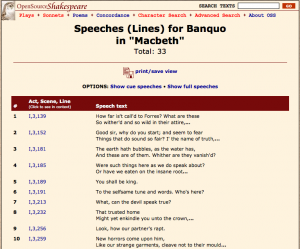 Further 2 short spoken cues herald entrances of his speechless, gory-locked ghost in Act 3-scene 4. Further 2 short spoken cues herald entrances of his speechless, gory-locked ghost in Act 3-scene 4.
Furthermost 1 final cue announces the entrance of his ghost, who punctuates the 8 generations of Kings he spawned.
That’s 34 speech cues in all.
This series of blog posts will be about working within this realm of Original Practices.
The outcome will be a one day (sold out) performance at the indoor Sam Wanamaker playhouse in Southwark’s outdoor Globe Theatre, on 20th July, 2014.
Excitement hardly contains what we feel about this project.
Educating Rita…
That’s Rita educated. Thanks Karen. Thanks Willy Russell. Thanks Self.
So what does it take to put on a staged reading of a theatre classic?
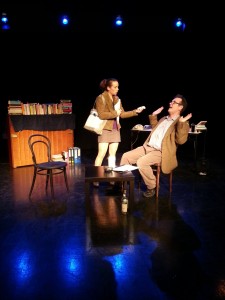
Two nights in the Theater Studio in Amsterdam. 14th and 15th may 2014. Audience of about 20 each night in a black box that holds 75-100 maxed out.
Produced by the titular Rita resulting in a profit margin of some 45 euros in the plus.
Theatre- paid for,
technician for the lights- paid for,
rights for the play- paid for (the biggest slurp of potential profit at 100 euros a night),
the actors- unpaid.
That’s for 4 rehearsals, the time analysing and marking up the script, the time spent gathering costumes, the bringing to and fro of the set and costumes to the theatre, and the hours spent on publicity and marketing.
Promo Video made from the Theater Studio performances
The seemingly futile trying to garner an audience, which experience shows will turn up on the basis of 1 out of every 100 solicited. The same old friends and acquaintances cajoled once more into supporting your passion. The promises of attendance and the excuses after they don’t show up.
Now all this written down seems so simple and so uncomplicated. The bare threads common to every production put on anywhere in any town. And believe me this isn’t a complaint. This is unfortunately the state of affairs I knew I was getting into when I answered the ad:
‘Wanted: actor 40-50 years for leading role in a play’
on the filmcastings.nl website.
The old joke typifies my acting career: ‘I didn’t get into acting for fame and fortune. And so far it’s working.’
Like Rita I made a choice. And like her, it was the only choice i could make. Without this, mere oblivion.
I didn’t choose acting, it chose me. My life was one big drama and a downwardly mobile spiral. My friends in the Rietveld Academy studied to be artists. I hung around the British Council library on the Keizersgracht watching free BBC Shakespeare films with pink eyes.
‘All the world’s a stage and all the men and women merely players.’
Oh how age shows that to be truer than truth will ever define it.
As Frank Bryant, the professor who educates Rita, says,
‘The only thing that I know, is that I know nothing.’
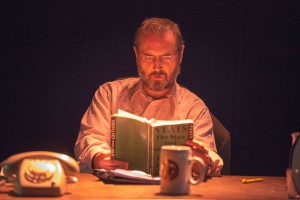 Frank Reading Yeats.
W.B. not the wine shop. The motto i follow for acting is ABW: Always Be Working. This thing we actors follow, the theatre, whether black box or Broadway, is bankrupt. The names will get paid, the supernumaries won’t. The rest of us do what we need to do.
We worship the written word for the insights it lends. Those few authors tried and tested in the theatre played again and again.
We, the actors approach them to test and hone and display our skills. Fully cognizant of lines such as ‘I detest the theatre’ when Rita cajoles Frank into going to see theatre for her first time. The process will continue though predictable.
New Ritas will stand up and claim their right to choose.
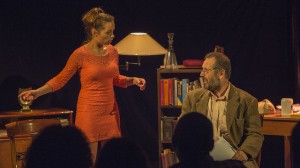 Rita stands up for her rights. More Franks will drown their pain on the knowledge that there is very little to be gained from that choice.
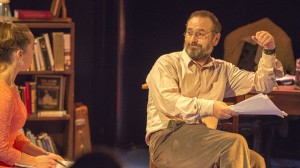 Bemused Frank Cynical?
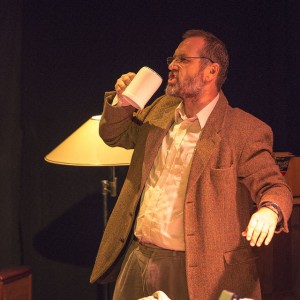 Frank drinks a draught No. Hopeful…
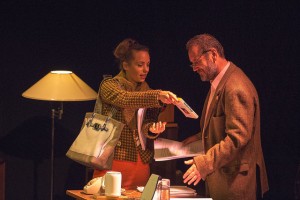 Rita offering great writer Rita Mae Brown Photos by Maarten Toner can be viewed in better quality here.
BTW we revived it at the end of July in the Badhuistheater Amsterdam. The houses were much better because word had got around.
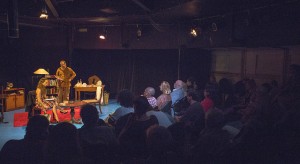 See more bums on seats!
and so into twenty fourteen. Our ears cannot be closed, whilst we live, speak, and breathe. Just back from experimenting with the passion in practice crew at the Jerwood Space in Bankside, Southwark.
Original practice workshop. Cue script of Pericles from the third folio and reassembled by Patrick Tucker, the original modern to dabble in Original Practice Performances at the Globe.
All 12 actors had been assigned roles with lots of doubling and tripling the lesser characters. I was given the 3 kings:
Antiochus the incestuous, no wife, one daughter;
Cleon the cuckold, one wife, one daughter;
Simonides (sigh mon i des) the honourable, no wife, one daughter.
The brief was that we would read for anomalies in verse meter etc and stamp in our cue lines and read when our cue lines were spoken by whomever they were spoken. We could not interact with other characters we knew to be in our scene, but save the full exposition for a sunday afternoon run through with a light, but judicious audience.
Passion in practice is a varying ensemble but with core members whose interest is exploring delivering shakespeare with a full understanding of what the verse is doing and a swift delivery playing the words. No long pauses and breathes in between meaningful moments, rather speaking the moment and see what emotions it will bring. The honesty towards yourself without being wanky about it, and above all honesty to the verse. The meaning actually takes care of itself, especially when given its context.
Physical work as an ensemble used sticks. We found out how two or three or four actors could explore the dynamics of a scene, while connected at the fingertips by sticks. Taking your stick for a walk works wonders, pairs or threesomes at one time.
The practice of cue script work using scenes from Makkers occasioned the inevitable whose line is it anyway; the re-reading of cue lines to check everybody heard; the muttered curses and doublings who ended up cueing themselves; the immediacy of staging on the fly; the expected accident of kneeling when you shouldn’t; and the happy accidents when the pronunciation of Simonides by the three fishermen gets turned into a running gag throughout the Simonides’ scenes.
We had an older Gower in Original Pronunciation and a young Pericles, who switched to young Gower in OP, and older Pericles in a breathtakingly focused scene of Pericles and Marina’s reunion. ‘A pats the stage and gestures her to him, the verse came to life as audience and cast enrapt in the original tale we all pieced together. Theatre magic.
Minimal music, minimal props, minimal decor, hanging cloths from lighting beams, audience Globe-like on three sides. Mistakes are inevitable. But oh, the successes.
An eclectic bunch of actors, Hilton the most experienced and the least ensemble, until the inevitable pull of the gravitas of the situation and the possibility to create wonder and lumps in several throats. Chicken skin, the Dutch say. Goosebumps, we.
Then to the Lord Nelson across the road for celebratory drinks, big plates of chips and a 7pm closing time. Oh England! Another pub down the road resolved the disappointment and the lure of pints of London Ale. Then we separated back to our workaday actor lives, in our case refreshed.
The diversity and skills of the actors was admirable. All fluent in metrical tricks and prose characterisations, all able to think on their feet. The narrator static, the scenes unfolding actus by scenae. Cue words became the aural signal for an entrance, or chance to take your part in the ongoing action. Perform that action, keep out of the way, be aware of sight lines, and above all pick up on the pace. Frequent contact with your acting partner’s eyes, tell you he or she too is working on the fly to survive the chaos of this story unfolding itself.
Reading of a cue script, changes the dynamic of acting from the sight and mind, back to where it belongs in the ears and imagination. You remain alert waiting for words that could come out of anyone’s mouth. Though by time we hit the stage we all knew who played who, but not what they said, whether one line or twenty.
All 3 Kings had so much character in the way they were written. Their psychology is in the words. We find it is possible to merely make the sounds and let the audience deal with what they mean. The medium we actors be. The characters interact and the actors try to keep up with how fast things are moving.
The theme of Pericles is incest and his voyage to Antioch uncovers this sinne. He scapes back to Tyre before shipping off to relieve famine ravaged Tharsus with ships stuffed with grain not armes. He is made a demi-god by King Cleon, who promises he and his wife are endebted forever. Pericles sets sail, shipwrecks off Simonides coast and joins a chivalric courting of his daughter, Thaisa.
These two marry, Thaisa has a child at sea, dies during childbirth, is sealed in a coffin and thrown overboard to appease the gods of the storm. Pericles calls their daughter Marina and sails back to Tharsus to leave her in the care of Cleon and his wife, Dionyzia.
During her upbringing in the next 16 years or, so their own daughter Philoten pales in virtuous comparison to Marina, so Dionyzia plans to have her murdered. Leonine her servant takes her on a walk, where they are surprised by pirates, who take her and sell her to a brothel keeper.
But you may know the story. if not try George Wilkins version here. Plain prose from the man who collaborated with Shakespeare to make the stage-play. He was also a pimp before making a career out of miseries. Oh yes, and they lived together at the Montjoys, both depositioned in 1612 in the Bellott Montjoy suit. But that’s another post.
The most valuable take away point for our-self this weekend is that hearing a play, isn’t only the reserve of the audience. The actors themselves are engaged in listening and responding in a different way than if they know the whole script. It all occurs primarily on an aural level. (We are aware of the nonsense of this statement, but time gives it the proof).
Secondly, inherent staging happens as the scene increases in focus. How else does a man silent for 3 months, realizing the daughter he thought dead is trying to break his silence, react? Focus is the key.
Lastly, We want more. Passion in Practice has a few workshops coming up and these pay for us to do this. Next one is on 19th January. Details here. And its affordable too.
Then back home, a mate sent me this link on the acoustic world of Elizabethan England. Rather apt.
Sight is the primary sense of the 21stC. Our ambient surroundings are shipwrecked on the shores of technology and advancement. Here’s to the sound of pigs in our inner city soundscapes. Anyway go wrap it in your ears. It’s a bit of a sit at 55 minutes, but well worth stopping, and listening to a bygone world, go by.
What’s in a name?
Love this discussion about Petruchio.
In Q2 of Romeo and Juliet (1599), at what modern editors would number 3.1.90, occurs a line of type, centered and reading “Away Tybalt.” It looks like a stage direction, and is so taken by most editors. But in 1960, George Walton Williams wrote an article claiming that this is in fact a line of dialogue. The Q2 compositor doesn’t use “Away” to mean “Exit,” speech prefixes for minor characters are often omitted, and there is a neat parallel later in the scene with Benvolio’s “Away, Romeo.”
Williams has a plausible argument, and, in any case, he is by common consent irreproachable. (As with Sara Lee, nobody doesn’t love GWW.) But his claim has put a sting in Rene Weis, with which he might do mischief in his Arden3 edition of the play. Since Weis accepts “Away, Tybalt” as speech, he needs a speaker. And where a less adventurous editor might settle for “Another Capulet” or “Tybalt’s follower,” Weis decides that the line is spoken by “Petruchio.” [!!!]
Now there is a Petruchio in the play: he is one of the three young men, including Romeo, whom Juliet asks the Nurse to identify for her toward the end of the ball scene. “Young Petruchio” is therefore currently present in Verona, as well as sufficiently friendly to the Capulets to be invited to the ball, sufficiently young to go looking for trouble in the streets, and of sufficient social rank to address Tybalt as “Tybalt” rather than “sir.”
The other young man has of course the same credentials and might be thought to be marginally more likely for being more familiar: the Nurse identifies him immediately, but only thinks the other to be young Petruchio. Still, “The son and heir of Old Tiberio” would be an ungainly prefix for a two-word speech. Petruchio is the better choice.
Shakespeare may in fact have been having a little intertextual fun here, because we hear earlier in the scene that Old Capulet and his cousin last masked some thirty odd years ago at “the nuptial of Lucentio,” which sounds like the last scene of Shrew. Admitttedly, we don’t hear of any masking or dancing at Lucentio’s “banquet,” but maybe that happened after we left, and in any case, old men tend to remember with advantages.
If the Capulet cousins were in the audience for Kate’s submission speech, one expects they were deceived into taking it at face value. But more important, if his brother-in-law’s wedding was thirty years ago, the Tamer himself must now be (by Our Lady) inclining to threescore, and clearly not the Petruchio of the Capulet ball. This might be his son, with something of his old man’s truculence, or even—eheu fugaces—his grandson.
Probably neither, however, is Tybalt’s companion. The key to solving that problem is the fact that when Petruchio—the real Petruchio—first appears on stage, he calls himself “a gentleman of Verona.” This immediately recalls the two titular gentlemen, and –sure enough—we find one of them on Capulet’s guest list: “Signor Valentio and his cousin Tybalt.” Tybalt’s cousin!
Of course, “Valentio” isn’t exactly “Valentine,” but Shakespeare may have felt the need for a variant to distinguish him from Mercutio’s brother, Valentine. “Signor” might sound like someone too mature for gang-banging, but Valentine may have earned the honorific for his legendary captaincy of supremely high-minded outlaws, and, in any case, he is (like Fredinand) the son-in-law of the Duke of Milan. Since he has a record for armed robbery, he would appeal to Tybalt as a formidable back-up, yet Valentine has a sense of moderation as well—he forbade his footpads to do violence to silly women or poor passengers. This is just the man to say, “That’s enough, Tybalt. Let’s go.” (His outlaws’ enthusiasm for Valentine’s linguistic skills was a recognition that he could holler “Stand and deliver” in whatever language was appropriate to the victim.)
Weis’s “Petruchio” opens a fertile field of investigation if one may shop the canon to give names to the anonymous inhabiting the locale. I thought of Dromio for the illiterate servant with the guest-list, but since slavery is probably illegal in Verona, I settled for Launcelot Gobbo, who, after getting in trouble in Belmont over inseminating the Moor, might well have looked for a new job. The anonymous Nurse—(forget the Angelica business)—could well be Nell Quickly. The Capulets, like many Italian aristocrats, often employ English servants, and Mrs Q has already, flouting her employer’s wishes, helped Anne Page to run off and marry the man she loves. For the apothecary, who has seen better times, is very short of money and has learned that “the world’s law” is no friend of his, who else but Shylock?
Other and probably better discoveries will surely follow. Hopefully, they will observe the maxim that resonance trumps probability.
Or it might just be a stage direction.
There are several others in the play named and not necessarily seen.
Like Antony and Potpan and Nell and Susan Grindstone amongst the Capulet servants.
All of them knaves according to Capulet’s commands.
Also the son and heir of old Tiberio and the afore-mentioned young Petruchio.
The party guests named in the letter the servant can’t read. Illiteracy and literacy being sharply delineated by the Petrarchan love of Romeo and the grounded first true love of Juliet. Artifice vs Nature.
‘Signior Martino and his wife and daughters;
County Anselme and his beauteous sisters;
the lady widow of Vitravio;
Signior Placentio and his lovely nieces;
Mercutio and his brother Valentine;
mine uncle Capulet, his wife and daughters;
my fair niece Rosaline; Livia;
Signior Valentio and his cousin Tybalt,
Lucio and the lively Helena.’
A fair assembly indeed as in the ball took place and one assumes they are among the mingling guests,
including
Valentine the absent brother of Mercutio.
And just where the hell is Rosaline, except on about five or six key characters lips and on the invitation. A Capulet and Juliet’s cousin. Sister to Tybalt, no; Lord Capulet’s side of the family and fair?
Then those musicians first, second, and third: Simon Catling, Hugh Rebeck and James (Jack) Soundpost. Usually assigned character descriptions as 1st 2nd 3rd Musician when they are readily identifiable and have specific monikers. The music of love in the play being firmly grounded in words and not music, as in the callous musicians hanging out for a free meal while the supposedly dead Juliet lies upstairs. No music with her silver sound for heart’s ease unless you pay for it. The Friar had promised them a gig he knew would not be going through.
It’s funny that the servant names are very English and not very Italian.
The watchmen likewise first second third. No names but there are more than just two companions commanded by the first:
‘go some of you whoe’er you find attach’ suggests several to search the immediate vicinity and arrest suspects,
‘go tell the prince’ is to Paris’ page
‘the Capulets’ 2nd watchman
and ‘the Montagues’ 3rd watchman
and then some others search.
Who’s left? The ghosts of Mercutio and Tybalt?
So how many are there?
The citizens too who are sick of the feuding and interrupt the first street brawl.
All help to populate this civic fiction, this two hours traffic of our stage.
My favourite bit of aurally nominally truthful text is Juliet’s:
My ears have not yet drunk a hundred words
Of that tongue’s utterance, yet I know the sound:
and indeed their recently spoken and shared sonnet amounts to about 90 words for Romeo.
Art thou not Romeo and a Montague?
What’s in a name?
Sound and fury signifying nothing. Or everything. Or something.
1. POEMS ABOUT Shakespeare 6435 reads. Always been the leader of the pack this one.
2. POEMS ABOUT Language… 4045 reads. One of my favourite sections.
3. A PAPER – A Prosodic Odyssey: Sorting the sonnets from page to stage. 2351 reads. A paper on the quarto of sonnets and its contents.
4. GUEST Post: Translating Shakespeare to “Modern English”: A Defence 2198 reads. I ass u me it’s fourth deservedly so.
5. BLOG’s WEE MANIFESTO… 2093 reads. Written for the Scotsman when at the Fringe.
6. MERES- Palladis Tamia allusions 1598 1819 reads. My fifth but really sixth. Newly enlarged with links to a facsimile and that Latin translated.
|
Look and Listen to Others
Online Works of Shakespeare
Play School
Renaissance School
Scholarly Renaissance-related blogs
Shakespeare Blogs
Shakespeare Institutions
Shakespeare or SOMEONE ELSE?
Sonnet School
|









